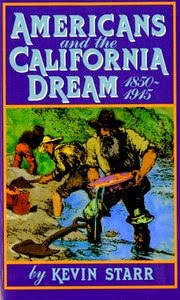The Donner after party: More from Kevin Starr on California's noir history
I made my travel reservations this week for Bouchercon 2014, and I celebrated by reading a bit more of Kevin Starr (click the link, then scroll down), that lively chronicler of California history whose work I discovered when I visited the state last year.
Starr ranges widely, writing not just about events, people, and phenomena, but also about California's image of itself and about the state's place in the psyche of Americans everywhere. It's no accident that each book in his multi-volume history of California has the word dream in its title.
Starr occasionally invokes noir as a reflection of the disillusionment that must necessarily result when a person, place, or thing becomes the focus for such desperate dreams as California does, and I opened Americans and the California Dream: 1850-1915 at random on one of the most horrible episodes in American history, though horrible for a reason one might not expect. That episode is the Donner party, and Starr's account makes clear that the lingering horror lay not in the cannibalism and privation of the stranded party of would-be California settlers, but in its afterlife.
Survivors of the party, Starr wrote, resumed normal lives, and in time "became respected for what they had undergone." The real victim, in Starr's version, was a survivor named Lewis Keseberg, discovered by a party of rescuers-cum-scavengers out for $10,000 in cash the Donners were said to be carrying. Convinced that Keseberg knew where the money was, Starr writes, the reward-seekers beat him and accused him of killing Mrs. Donner. Keseberg protested his innocence, and, years later, did so before Donner's daughter Eliza, who had survived the party. She believed him, Starr writes.
In the meantime, though, the scavengers' accusations made the newspapers, and Keseberg became a pariah and a tragic figure, the scapegoat for the collective barbarities of the party. He sued for slander, won -- and was awarded a dollar in damages. "In 1895, after fifty accursed years," Starr writes, "Keseberg died in Sacramento--peacefully, saying nothing, asking nothing of anyone, like those who have long lived beyond the reach of human sympathy."
That sounds pretty noir to me.
© Peter Rozovsky 2014
Starr ranges widely, writing not just about events, people, and phenomena, but also about California's image of itself and about the state's place in the psyche of Americans everywhere. It's no accident that each book in his multi-volume history of California has the word dream in its title.
Starr occasionally invokes noir as a reflection of the disillusionment that must necessarily result when a person, place, or thing becomes the focus for such desperate dreams as California does, and I opened Americans and the California Dream: 1850-1915 at random on one of the most horrible episodes in American history, though horrible for a reason one might not expect. That episode is the Donner party, and Starr's account makes clear that the lingering horror lay not in the cannibalism and privation of the stranded party of would-be California settlers, but in its afterlife.
Survivors of the party, Starr wrote, resumed normal lives, and in time "became respected for what they had undergone." The real victim, in Starr's version, was a survivor named Lewis Keseberg, discovered by a party of rescuers-cum-scavengers out for $10,000 in cash the Donners were said to be carrying. Convinced that Keseberg knew where the money was, Starr writes, the reward-seekers beat him and accused him of killing Mrs. Donner. Keseberg protested his innocence, and, years later, did so before Donner's daughter Eliza, who had survived the party. She believed him, Starr writes.
In the meantime, though, the scavengers' accusations made the newspapers, and Keseberg became a pariah and a tragic figure, the scapegoat for the collective barbarities of the party. He sued for slander, won -- and was awarded a dollar in damages. "In 1895, after fifty accursed years," Starr writes, "Keseberg died in Sacramento--peacefully, saying nothing, asking nothing of anyone, like those who have long lived beyond the reach of human sympathy."
That sounds pretty noir to me.
© Peter Rozovsky 2014
Labels: Americans and the California Dream: 1850-1915, California, Donner party, history, Kevin Starr, noir


4 Comments:
California noir - East of Eden? Considering that it is based on the story of Cain and Able, could the Bible, by association, be considered Hebrew noir? Timshel?
The Bible always comes up in discussions of pro to-noir. I've only ever seen the movie version of East of Eden, but one strand of the story (if my memory serves me well) reminds me strongly of the pattern of dreams and disappointment that Starr sees throughout California;s history: that of the character who has the scheme to ship produce East in a refrigerated rail car, but whose dreams comes to nothing when his produce wilts and spoils when the car goes nowhere.
I have been reading Kevin Starr's California this summer. It's a history of the state in a single volume. I agree with you about his writing and about his ability to find those little stories that really capture the reader's interest.
I plan on starting the full series soon. I've already got this one on my TBR shelf.
I read the one-volume history after a visit to California last year and liked it so much that I have since bought two books in the multivolume series. Every city, state, and country should have a historian with Starr's flair and love for his subject.
Post a Comment
<< Home